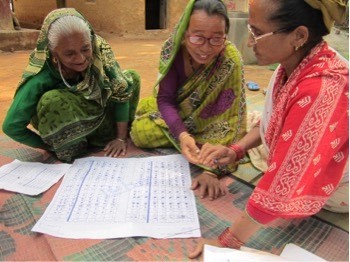The Election Commission Nepal’s voter education campaign, conducted with support of UNDP’s Election Support Project in 29 districts, has proved largely effective in bringing more people to the polls and ensuring their familiarity with the voting procedures so as to minimize the number of invalid votes around the country.
“Before I took part in the mock polling, I had no idea the ballot paper would be that complicated,” remembers Shakuntala KC from Banke. “I felt lost in the long list of symbols when I first looked at the sheet.” In fact, Shakuntala had been unsure of whether to make the trip to the polling station at all since it was Ropain or rice cultivation season at the time of the election.
But after the mock polling session—part of a massive voter education campaign organized by the Election Commission Nepal (ECN) with the support of UNDP’s Election Support Project (ESP) and conducted by contracting local NGOs in 29 districts—where she and others were given clear instructions on navigating the voting process, Shakuntala says she was motivated to line up to cast her ballot.
A total of about 150,000 registered voters were oriented on the importance of exercising their voting rights, and the correct way to mark the ballot paper. These mock polling exercises, where participants were given hands-on training in the voting procedures, comprised the prime activity of the community-level voter education programme.
“It has been a very satisfying experience to guide the voters in exercising their rights and making their voices heard”, Yasodha KC, a trainer in the campaign, says, “Many of the voters would have been confused with the ballot paper in the absence of such orientations, and this would have had a negative impact on democratic practice.”
In line with Yasodha’s experience, voter Shora Ram Khadka shares, “The campaign has been absolutely eye-opening. Previously I assumed that I knew everything about the electoral process, which proved to be wrong after I attended the session.”
Surya Prasad Aryal, Under Secretary and Information Officer at ECN says that despite having conducted such campaigns in a well-managed manner, there were still votes that were found to be invalid in the elections. “Invalid votes are not unusual in elections anywhere, but imagine how much worse the situation would’ve been in the absence of such orientations,” he says.

Besides the mock polling sessions, various kinds of facilitation materials, such as posters, brochures and guidelines have also been produced in simple language with plenty of illustrations, so as to disseminate technical information regarding the electoral process in a more comprehensive manner.
These were handed out at voter education events, so that participants could pass on the knowledge to others as well.
All these efforts have proved exceedingly useful for voters like 62-year-old Padmi BK, who has voted several times in her life, but was still confused by the process—particularly the size of the ballot paper. But the orientation helped her to vote confidently on election day, and she even shared that she now knew enough to teach her grandson—who is pursuing his higher studies in the city—to cast his vote properly.
“We have tried our best to reach the voters, especially marginalized and targeted communities with voter education and we are satisfied with how the campaign has proceeded,” said Nikila Shrestha, the Election Education Information Centre Coordinator at the ESP, commented. “We have been successful in conveying the core message that voting is not only the right of all citizens, but also an important duty.”
The community-level orientations are just one component of the voter education campaign, which also comprised trainings and interactions of other stakeholders, such as political parties and candidates, media, observers, volunteers and temporary staff for elections, and included broadcasting of radio and TV public service announcements and programmes, targeting youth and first time voters, women, marginalized groups and deprived communities as well. The ECN also established a call center with a toll-free phone number to respond to general people’s queries at any time.
Photo Credits: UNDP Nepal
The Electoral Support Project- Phase II (ESP) is a technical assistance initiative which focuses on a long-term institutional and professional capacity development of the Election Commission (ECN) for conducting credible, inclusive and transparent elections at a national. The objectives of the project are 1) to strengthen the capacity of the ECN to function as an independent and credible institution, 2) to allow the conduct of the election cycle in an effective, sustainable, and credible manner, and 3) to increase democratic participation, particularly for under-represented and disadvantaged segments of the Nepali society. ESP is currently funded by EU and Norway.
